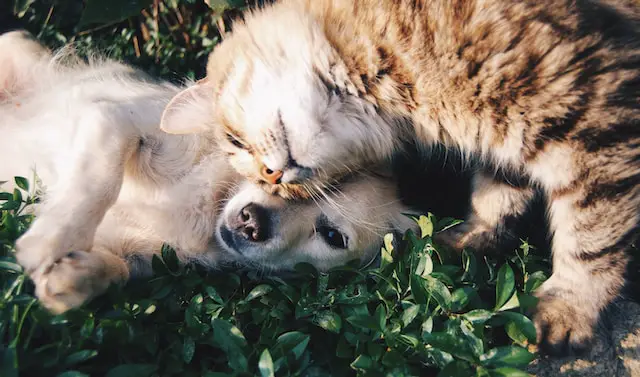There are no restrictions on a person opening an animal rescue and no requirement to be registered. While we list a large number of animal rescues in Ireland it is up to the individual to ensure the rescue you chose to support is a good rescue.
An animal rescue should be a safe space for an animal in need but unfortunately this is not always the case. Animal rescue is hard work, it takes time, dedication, and money. Most people get involved with animal rescue with good intentions in the beginning but it may not always stay this way. There are a number of ways and reasons a good rescue can become a bad one. Once the donations start to come in greed may set in and the personal gains may become more important than the animals in their care. In other situations the rescuer may get overwhelmed with the number of animals needing care and take on more than they can handle. There are a few warning signs you can watch out for prior to supporting a rescue. If at any time you suspect animal cruelty it needs to be reported. Click here for the ISPCA cruelty complaint form.

Warning Signs Of A Bad Rescue
Below are some of the warning signs to watch out for when adopting from or supporting an animal rescue.
1. You Aren’t Allowed To Meet The Animal Before Adoption
If you are considering adopting a dog, cat or any other animal the first step should be arranging a meeting with your potential new pet. All animal rescues should allow for this. Reading bios on a website or seeing pictures or videos of an animal is no substitute for meeting them face to face. You should also be allowed to interact with the animal in a safe space.
2. Making You Rush Your Decision
For a good rescue the main aim is the long term happiness and well being of the animal. A rushed adoption will rarely achieve this. In some cases you might need to make the decision to adopt a dog quickly if there are a number of people also wanting to adopt that same animal but you should never feel pressured by the rescue to do it.
A dodgy rescue may put pressure on you to agree to the adoption. They might suggest dropping the animal to you without you having met it first. A good rescue will give you time to get to know the animal. Even if there are a large number of potential adopters a good rescue should be willing to place the animal on hold for you to allow time for both sides to be happy with the adoption. It will show if they really have the dog’s long-term interest in mind.
3. Takes New Animals Directly To Adoption
A big red flag is a rescue taking an animal straight to its adopted home before ever taking it to the rescue. The animals should be assessed and vet checked. This is important for all animals but especially dogs from a pound or if the rescue transports dogs from other areas.

4. Always Asking For Donations
It is normal for a rescue to promote ways a person can donate to support them. What is not normal is constant emergencies that they are looking for donations for. Claiming they can’t afford this month's vet bills without urgent donations. Showing the bank balance is low and needs money straight away or the animals will go without food. These tactics play on people's emotions and are a scam to get money. They may also run competitions or raffles regularly but never reveal a winner or send out a prize.
Another warning sign is asking for donations for a particular project such as new kennels but then never completing it or giving updates on funding or the stage of the project. A good rescue will not operate in this manner.
5. They Don’t Take Animals Back
While the rescue's main aim will be for a lifelong adoption there will be situations where the animal needs to find a different home. A good rescue will always include a clause that in this situation the animal should be returned to them for rehoming. If it is not stated on the contract ask the rescues policy for this.
6. Adopts Animals Too Young
It Is illegal to sell puppies and kittens before 8 weeks of age. The same should apply to rescues. They are too young to leave their mothers before this age. While a rescue may look for foster homes for young animals in the event that they are without a mother they should never be up for adoption until they have reached the 8 week mark.
This applies for other animals too. For a rabbit it must be 6 weeks old. A guinea pig, gerbil or hamster must be 4 weeks old. A ferret must be 8 weeks old and a mouse or rat must be 4 weeks old.
7. Dogs Not Microchipped
All dogs must be microchipped by a vet and registered on an authorised database by the time they are 12 weeks. This is a legal requirement.
8. Doesn’t Vaccinate Or Give Proof Of Vaccinations
Avoid a rescue that does not give proof of vaccinations or that openly does not vaccinate prior to rehoming. To avoid spread of disease at the rescue vaccinations should be one of their main priorities when they take in an animal. You should also be given information on when the animal is next due a vaccination shot.
The vaccination record should show which vaccines your pet had on which date, the weight of your pet and which veterinary professional performed the vaccination. If in doubt about what the animals should be vaccinated against for their age check with your local vets.
9. Not Spaying Or Neutering
The reason rescues exist is because of the oversupply of pets. It is a massive red flag if a rescue were to rehome an animal with spaying or neutering first unless it is medically unsafe to do so, due to age or health. If the animal is too young they should ask you to sign a contract to confirm you will have it done when the animal is of age.
Spaying and neutering should be done on dogs, cats and rabbits and any other pets it is safe to do so. For horse and donkeys you should be asked to sign a contract to state no breeding of the animal is permitted.
10. Rescue Has Poor Communication
Rescues are generally very busy and mainly run by volunteers. It may take a while to receive a reply. This is normal but they should also be able to give an estimate of how long it takes to reply.
It can be of a warning sign if the rescue is constantly advertising animals and asking for donations but yet never finds the time to respond to a potential adopter. A good rescue will prioritise communications with the public as they need the public to help them find good homes for the animals in their care.
11. Claims To Never Euthanise An Animal
A rescue's main aim should be to find good homes for unwanted, neglected, abused and abandoned animals. In general they are what I would consider no kill shelters. But claims that they will never put an animal to sleep is a warning sign. Most rescues will have situations where it is a danger to the volunteers or community to keep an animal alive. This is not an easy decision for a rescuer to make and they will not take it lightly. But refusing to even consider doing so is questionable behaviour by a rescue group. Find a rescue whose decision making in these situations aligns with your ethics.
12. Is Hoarding Not Rescuing
An animal hoarder is a person who keeps or breeds dogs and other animals without rehoming or having the necessary space, funding or ability to care for the animals. They will not have set out for this but it can be a situation that spiraled out of control. The person may have been doing well initially but health or financial issues might have started the problem and it has gotten out of hand. While it is honorable to take in animals in need, it is not good to do so without the ability to care for them. Some rescues in Ireland are unfortunately hoarding situations. If you suspect someone to be hoarding animals contact the ISPCA. Click here for the ISPCA cruelty complaint form.
13. Lack Of Cleanliness Of Animal Shelter
A good rescue will have a cleaning roster to ensure the shelter is kept in good condition. This is very important to prevent the spread of disease. A warning sign of a rescue would be seeing aged animal feces, dirty bowls and no signs of cleaning taking place daily. A rescue should know the maximum number of animals they have the ability to care for and be strict on not taking in more than this.

Irish Example: East Galway Animal Rescue
While it can often feel like these situations would not happen here there are examples of investigations into rescues often. The most memorable one for myself was East Galway Animal Rescue. While I never visited the rescue I did follow it on social media and had donated at least once.
A WOMAN IN Galway has been fined €250 for animal cruelty after eight neglected dogs were taken from the rescue centre she runs last year. Sarah Gunther, who runs East Galway Animal Rescue in Moyglass, Loughrea, was charged with eight counts of animal cruelty and received the fine last Wednesday at Galway District Court.
It follows the discovery of a number of severely neglected dogs by staff of Galway SPCA, who were called to the scene in July last year. At the premises, which has a derelict house and a number of outbuildings, GSPCA staff and gardaí, found what the charity described as “dilapidated kennels” and rubbish. On its Facebook page, GSPCA said feed bowls were “embedded in the dirt” and a dog corpse was found in one of the kennels, as well as a number of animal skulls.
As reported by The Journal, 14th July, 2014. WARNING: This article contains some graphic images.
This was a well known rescue, mainly specialising in bull breeds. They received government funding also. They had a large following and received a lot of donations. For reasons unknown, the rescue turned to one of animal cruelty and was shut down with the owner banded from restarting an animal rescue.
Want to adopt but rescue is showing red flags: What to do?
In most cases the answer is REPORT and walk away.
If you suspect any issues with the condition the animals are kept in then you need to report it. The rescuer themselves might also need help and adopting one animal from them and ignoring the problem is not helping in the long run. While it can be hard to walk away from a pet you had your heart set on, reporting the rescue to help all the animals in its care is the best option. The ISPCA regularly inspects rescues based on reports from the public. The ISPCA takes allegations of cruelty very seriously.
